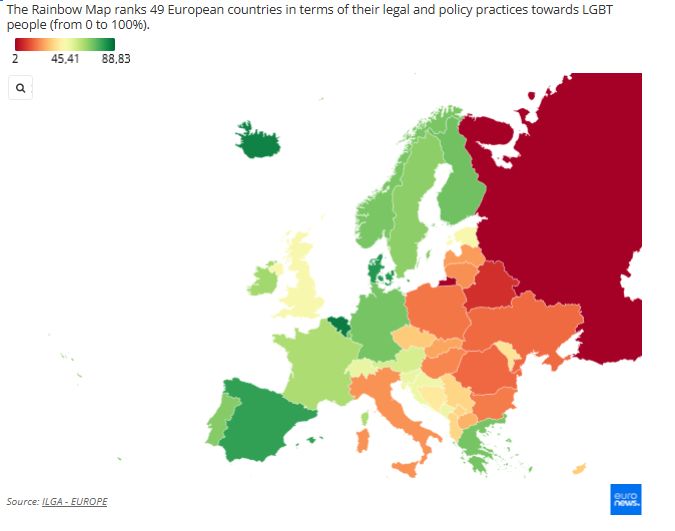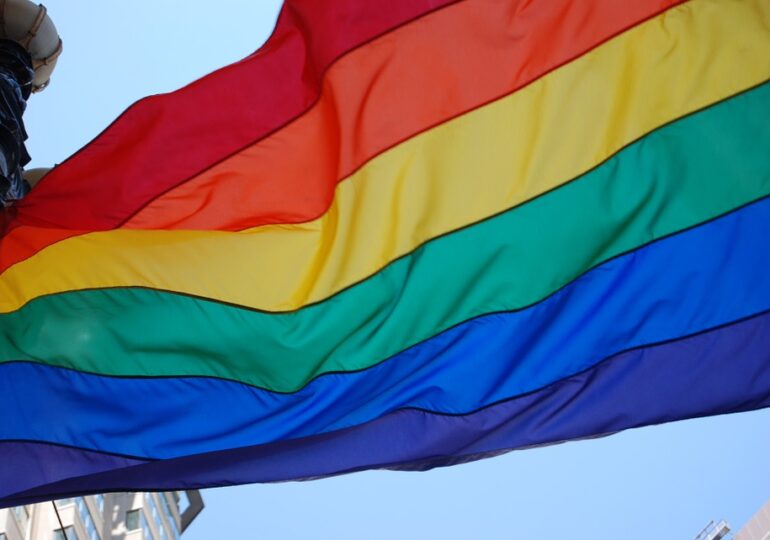A new ranking shows the progress of European countries regarding LGBT rights. Romania is at the bottom of the ranking.
Malta, Belgium, Iceland, Denmark, and Spain are the top five countries in the LGBT rights ranking, according to the Rainbow Map published by the European LGBT lobby organization (ILGA), as reported by Euronews.
Moreover, Malta has been at the top of the ranking in the last decade, with a score of 88.83%.
With 85 points, Belgium moved to second place after adopting policies that combat hatred based on sexual orientation, gender identity, and sexual characteristics.
Despite Belgium moving to second place ahead of Iceland, the latest figures from the Center for Equal Opportunities and the Institute for the Equality of Women and Men in Belgium have reported "worrying" cases of violence and discrimination against LGBTQ+ individuals. The Center reported 136 cases related to sexual orientation.
More than a third of these cases involved physical assaults and a similar proportion of serious harassment cases. These attacks are often committed by young people, sometimes in groups, and especially against other men.

The Rainbow Map evaluates countries based on several categories: equality and non-discrimination, family, hate crime and hate speech, legal recognition of gender.
Austria, Latvia, Germany, Czech Republic, and Poland have also recorded the highest increases in the ranking. Austria and Latvia moved up four places, while Germany, Czech Republic, and Poland moved up three.
Italy is also towards the bottom of the ranking, but the Constitutional Court decided on Thursday that both women in same-sex couples using in vitro fertilization abroad can be recognized as parents, even though only one of them is the biological mother of the child.
The average score for the EU is 51.13%, while for Europe, it is 41.85%.
Which countries have the weakest results
In 2025, some countries in Europe have experienced a decline in LGBTQ+ rights. Romania is at the bottom of the EU ranking with a score of only 19%, followed by Poland and Bulgaria, both at 21%.
The United Kingdom also dropped six places, reaching 22nd place.
Hungary dropped seven places after the first ban on the Pride march in the EU, criminalizing participation and organization of such events.
Participation in a banned event could result in fines of up to 200,000 Hungarian forints (503 euros), which the state must allocate to "child protection," according to the text of the law.
Campaign with LGBTQ+ in Romania
Romania's position in this ranking is not surprising, considering that the Government completely ignored the ECHR decision calling for a legal status for same-sex couples in our country.
Furthermore, the subject of "the gays are coming" was one of the preferred attack themes in the presidential campaign.
George Simion and his team tried to convey the idea to people, through fake news, that Nicușor Dan supports LGBT marriages.
Thus, posters appeared in Borșa with Nicușor Dan's photo and the message "Vote for the legalization of LGBT marriage."
Moreover, a deceptive video was circulated on social media giving the false impression that Nicușor Dan supports the promotion of LGBTQ ideology through sexual education classes in schools.
Even former Prime Minister Marcel Ciolacu stated that he fears he will be forced to wear a skirt if Nicușor Dan reaches Cotroceni.
"Of course, I never wish for Nicușor Dan to become the President of Romania, especially since I am a man. I don't want to be forced to wear a skirt, especially now that he also has USR behind him," Ciolacu said.
"Mr. Ciolacu is afraid he will be forced to wear a skirt if I reach Cotroceni. I can assure the Prime Minister that he will be free to wear whatever clothes he wants, but he won't wear them at Victoria Palace," Nicușor Dan replied.

